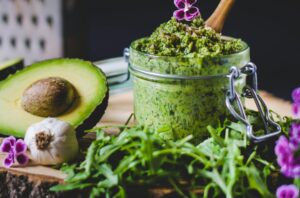Fat is a delicious food component that has erroneously had a terrible reputation for decades. Mountains of new scientific evidence show us that the health effects of fats in food are more complicated than good versus bad.
Whole populations shifted to low-fat foods, cutting out all fats bothharmfulandhealthful, and the switch didn’t make us healthier.
Fats provide energy; help the body absorb fat soluble nutrients such as vitamins A, D, E & K; it gives food texture and flavour making it taste good; it promotes satiety helping you feel full for longer; keeps your brain working optimally; forms the membranes of every cell in your body; and so much more.
All fats are not equal, which is why we have so much controversy.
There are different types of fats in the foods we eat,each having different effects on your health, so for long-term health some fats are better than others.
Saturated versus Unsaturated Fats
All fatty acids have a similar chemical structure – a chain of carbon atoms bonded to hydrogen atoms. What determines different fats from one another is the:
- Length and shape of the carbon chain.
- Types of bonds – or links – in the carbon chain.
- Number of hydrogen atoms connected to the carbon atoms.
These seem like small differences, but they can have a huge impact how they affect your health.
So, what makes a fat healthful?
Generally, unsaturated fat is considered “healthful”, which usually means that it will be liquid at room temperature, and are found abundantly in fish and plants like seeds and nuts.
Unsaturated fats are split into two main groups:
- Monounsaturated fats, found in extra virgin olive oil, avocados, and most nuts.
- Polyunsaturated fats,found in oily fish (e.g., salmon, mackerel, sardines, anchovies), flaxseeds, sunflower oil etc.
Prioritising these types of fats in your diet can help improve your metabolic and heart health.
Saturated fat has been labelled as “unhealthy” for years but when it comes to food it’s more complicated than that.
Saturated fats are abundant in meats, dairy foods e.g. milk, cheese, butter, and coconut oil.Because all the carbon atoms in saturated fats are joined together with single chemical bonds, their chemical structure is rigid, which is why they are solid at room temperature.However, these fats are not all the same, saturated fats in different foods can have varying effects on your health.
Cholesterol and Fats
For a long time, the scientific community thought that eating a lot of foods high in saturated fats leads to higher “bad” low-density lipoprotein (LDL) cholesterol levels. However, that has been totally disproven, dietary cholesterol intake has very little impact on total body cholesterol.Most of the cholesterol, which is vital for many metabolic functions, is produced endogenously within the body.
We now know that eating full-fat dairy products may reduce the risk of developing heart disease, type 2 diabetes, and poor bone health, despite the high saturated fat content. The PURE study, published in The Lancet in 2017, found that eating more saturated fats from dairy (except butter) was associated with lower mortality compared with eating more carbohydrates.
Trans fats
Trans fats are the harmful ones we need to be cautious of. From a chemical perspective, they look like unsaturated fats, however they are twisted in a different way around their carbon double bonds. Artificially produced trans fats that have been twisted and denatured due to processing called hydrogenation are the worst type of fat. This process is used to turn oils into solids like margarine and spreads. Because of their texture and low cost, they’re used widely in baked goods like cakes and pastries – they are best avoided.
During the 1990s researchers started to observe a link between consuming artificial trans fats, raised LDL cholesterol levels and the risk of:
- Heart disease
- Cancer
- Type 2 diabetes
- Depression
Thankfully, they are now restricted in the EU and have been banned by the US FDA.
Naturally occurring trans fats, found in dairy and meats, have not been linked to the same negative health effects as artificially produced trans fats. The body is cleverly designed to recognise and metabolise fats in their natural wholefood state.
In general, the effect a type of fat has on your body depends on the foods they are found in, your diet as a whole and how well you personally respond to fats. Nutrition is so nuanced, it is important to listen to your body and choose the foods that help energise,uplift you, and optimise your longevity and wellbeing.
Prioritise foods that leave you feeling nourished and well.


